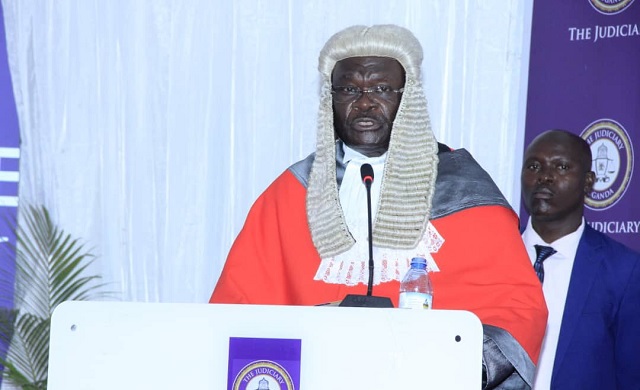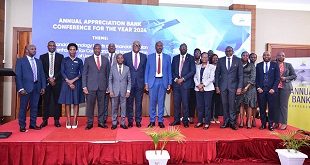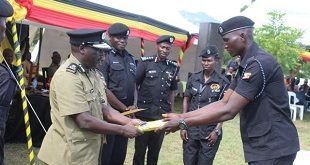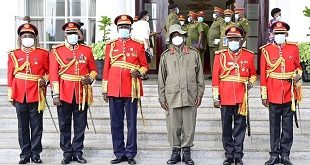
Kampala, Uganda | THE INDEPENDENT | Chief Justice Alphonso Owiny Dollo has outlined a series of strategies to address the problem of case delays and backlogs affecting the judiciary’s image in Uganda. Speaking at a five-day induction/retreat for 28 judges elevated to the Court of Appeal and Supreme Court, as well as newly appointed judges, Dollo announced plans to decentralize the Court of Appeal by creating regional circuits in Mbale, Gulu, Jinja, Mbarara, and Fort Portal.
This would require judges to move out of Kampala. Dollo commended the support of Parliament and the Executive, especially the President, and said that the decentralization would be actualized when the proposed structure, recently approved by Cabinet, becomes a reality, resulting in an increase in the number of judicial officers and judges.
Under the new structure, the number of Supreme Court justices would rise from 11 to 21, and those of the Court of Appeal from 15 to 56, while High Court judges would increase from 82 to 151. Lower courts would also be created to ensure that justice is brought nearer to the people. However, Parliament will first have to amend the Judicature Act to provide for the changes before they can be effected.
Dollo said that he would be happy if the changes happened during his lifetime, irrespective of whether he was still CJ or retired. He also announced that the judicial department would strengthen the Inspectorate to stamp out corruption and laziness, so that errant judicial officers “feel someone breathing down their necks.” These efforts are part of a wider project of judicial transformation to make the department more responsive to the needs of Ugandans, who have rated it poorly.
Dollo praised the good relationship between the judicial department and the Executive, “without losing judicial independence.” He revealed that the budget for the judiciary had progressively risen to almost UGX 400 billion from UGX 198 billion but added that he would be happy if the budget rose to UGX 800 billion to cater to the full proposed structure.
Dollo was also pleased to announce that the Supreme Court would soon move from improvised offices to a permanent home under construction at the High Court in Kampala, which he hoped would be ready by July this year. This would provide a more conducive environment for judges to discharge their duties.
Regarding the induction’s course content, Dollo praised the Judicial Training Institute headed by Justice Damalie Lwanga for promoting themes of collegiality, teamwork, and judgment writing. He also expressed his satisfaction that the delayed induction, which came after many of the completely new members of the bench had already begun service, would be richer.
Dollo said that this was also the first time that the Court of Appeal and Supreme Court judges had sat together to reflect as members of the same team. He encouraged the judges to ensure that their judgments are “exhaustive, coherent, and comprehensible” as they guide proportionality and consistency. He commended the International Development Law Organization (IDLO) for financially supporting the DTI and making the induction and retreat possible.
IDLO Country Manager, Barbara Kilei, expressed her pleasure at being part of the effort to improve the delivery of justice to Uganda’s citizens, particularly the most vulnerable, through skilling judicial officers.
She said that IDLO is the only intergovernmental organization committed to promoting the rule of law, advancing peace and sustainable development, enabling governments, and empowering people to reform laws and strengthen institutions and, ultimately, contribute to stable and inclusive societies. The article notes that Deputy Chief Justice Richard Buteera was present, and facilitators included retired former Principle Judge Yorokamu Bamwine and retired Justice David Wangutusi.
*****
URN
 The Independent Uganda: You get the Truth we Pay the Price
The Independent Uganda: You get the Truth we Pay the Price



THE ACADEMIA IN POLITICS:
Bishop Angelo Negri Primary School chose the JUDICIARY in the year 1989. This was because our people had chosen a TEACHER as the elected political leader in the General Election of 1980 [Lapwony Semogerere]
Lapwony Semwogerere worked with Rwot.Lakony and Dr.Silvester Ochitti the Pharmacist in the same National Executive Committee and the same National COUNCIL of the DEMOCRATIC PARTY IN UGANDA. They were Luo Nationalist, Acholi Nationalist and Ugandan Nationalist in the third generation of this great political party in TANGANYIKA.
WE OWE THIS COUNTRY.